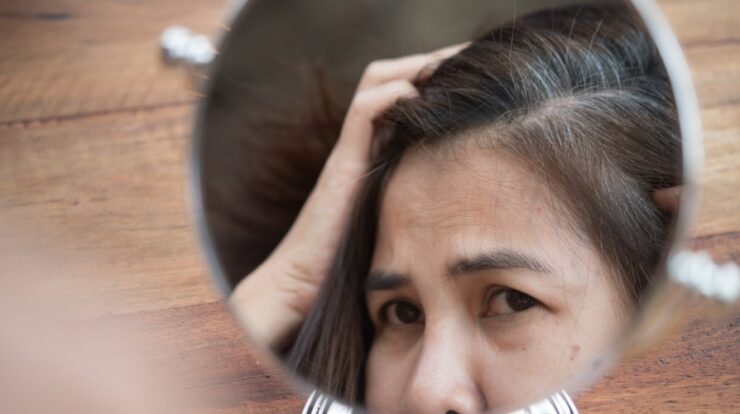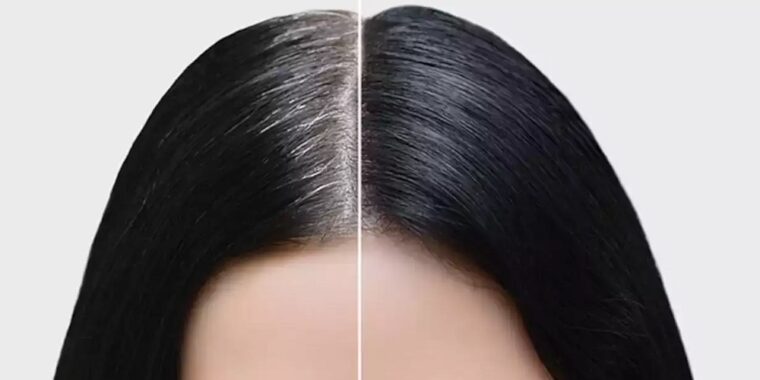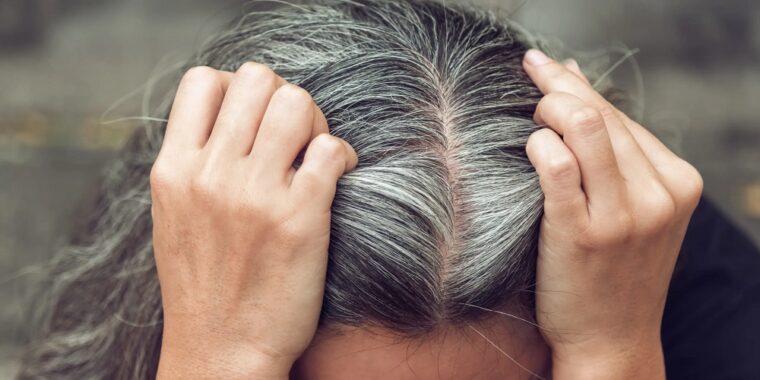
The presence or absence of melanin in a hair follicle determines the color of the hair. Melanocytes, specialized cells, inject the pigment into the hair shaft. Our hair follicles generate less melanin and fewer melanocytes as we age, resulting in white or white hair.
Factors In The Environment
The onset of white hair at a young age has been linked to genes. You would be white if your parents got white at an early age. Researchers discovered in 2013 that geography and ethnicity also play a role. If you want to know why certain people in one nation grow white faster than others, Wellhealthorganic.com has an excellent article on the reasons behind white hair and simple techniques to prevent it organically. Even in their forties, white people might have white hair. It is, however, more common in Asians. Around the age of 30, African Americans often develop white hair.
Life Is Tight Right Now, More Than Ever
The hair follicle secretes norepinephrine in reaction to emotional stress. White hair appears because this substance promotes melanocyte stem cells to rapidly specialize into pigment-producing cells and move out of hair follicles. However, stress and diet are not the only factors. Some medical conditions, such as constipation, might accelerate hair whiteness. Hormone imbalances and heredity can also play a role. Wellhealthorganic.com has further information on what causes white hair and simple ways to avoid it.
Diet
A poor diet may expedite the aging of the hair. A diet strong in processed foods, salt, and sugar is connected with increased free radical generation, which can lead to white hair.
Tobacco Consumption
Tobacco usage and other lifestyle factors have a role as well. Some people feel that excessive light exposure causes the skin to age faster and promotes premature greying. According to 2013 research, smokers are likelier to have premature white hair.
Nutrient Deficiency
A lack of vitamins, like biotin, B vitamins, D, and E, may speed up the greying process. A lack of vitamins can impair pigmentation. This, however, can be remedied by using nutritional supplements. Well, you should see your doctor before beginning any new nutritional supplement plan.
Thyroid Complications
Hormonal changes caused by hypertension or hypothyroidism can lead to premature greying of the hair. Your thyroid status has a big influence on the color of your hair. If your thyroid hormone levels are too high or too low, your body may create less melanin, an essential pigment for colored hair.
What Should You Eat To Ward Off The White?
The meals listed below might help you protect your hair from becoming white.
Eggs
Eggs are an amazing source of biotin, a vitamin that promotes healthy hair development and prevents the onset of greying.
Leaves Are Getting Thinner
Vitamin B12, which is abundant in leafy greens like spinach and kale, helps produce melanin, the pigment responsible for hair color.
Seeds And Nuts
Copper, a mineral essential for melanin formation, is abundant in nuts and seeds like almonds, walnuts, and sesame seeds.
Fish
Fatty fish, like mackerel and salmon, are a great source of omega-3 fatty acids, which nourish hair and delay greying.
Berries
Berries, such as strawberries, blueberries, and raspberries, are high in antioxidants, which protect hair from damage and prevent greying.
Swede, Also Known As Sweet Potato
Sweet potatoes are an amazing source of beta-carotene, which is transformed into vitamin A and aids in the production of sebum, essential for healthy hair and the prevention of greying.
How To Easily Avoid Going White?
Good Nutrition
To maintain healthy hair, eat a well-balanced, nutrient-dense diet. Eat meals high in Vitamin B12, Vitamin D, Iron, and Copper to prevent white hair. Eat dairy, eggs, seafood, nuts, whole grains, and vegetables to ensure you receive adequate calcium and protein.
Amla, Also Known As Indian Gooseberry
Amla, commonly known as Indian gooseberry, is a good source of vitamin C that assists in the synthesis of melanin. Using coconut oil and amla powder on your hair once a week would be best.
Lemon Juice With Coconut Oil Juice
Coconut oil is an excellent hair conditioner, while vitamin C is abundant in lemon juice. Prevent premature greying by treating your hair with coconut oil and lemon juice twice weekly.
Curry Leaves
Due to their high antioxidant content, Curry leaves can help prevent premature hair greying. Massage the oil into your hair after heating curry leaves in coconut oil twice weekly.
Henna
Using henna and other natural hair tints, grey hair can be concealed. Mix some henna powder with water or tea once a month and apply it to your hair.
The Juice Of Garlic
Catalase, which can help suppress the generation of hydrogen peroxide in hair follicles, is abundant in onion juice, a good enzyme source. The finest benefits come from using onion juice twice weekly on the hair and scalp.
Indira Petroleum
Bhringraj oil is well-known for more than only hair growth and coloration. Once a week, massage your scalp with bhringraj oil.
Yoga And Meditation Are Examples Of Techniques
Anxiety and stress have been linked to early hair greying. Yoga and meditation help relieve stress and anxiety, which promotes healthy hair development. Lentils are a great source of iron, which promotes healthy hair development and helps to prevent greying. With the help of these nutrients, white hairs can be prevented or eliminated. It is essential to remember that healthy nutrition alone may not be enough to prevent or reverse premature grey or white hair. Never attempt treatment without first consulting a professional.
Is Having White Hair A Sign That You’re Becoming Older?
White hair is generally linked with old age, despite scientists still being baffled about why hair becomes white. Both inherited, and environmental factors can cause hair greying; in most cases, both are at play. According to one idea, the melanocytes (pigment-producing cells) in our hair follicles die off as we age. Hydrogen peroxide accumulates inside the hair follicle, bleaching the hair shaft. Inflammation and oxidative damage age are also potential factors in this technique.
Another idea argues that premature greying is caused by a lack of melanin in the hair. Melanin is a pigment in our skin, hair, and eyes that gives them unique colors. Our bodies naturally create less melanin as we age, which can lead to grey hair. Some environmental factors that may speed up the greying process include smoking, extended exposure to sunshine, and certain medical problems. It’s crucial to remember that many people’s hair greys for no apparent environmental or medical reason. The specific origin of grey hair is uncertain; however, genetics and environmental factors are potential factors. See a dermatologist or medical professional if you are concerned about becoming grey too soon.
What Role Does Diet Play In Hair Coloration?
Is it possible for your hair color to be affected by what you eat? Yes, in a nutshell, but there’s more to the story. The pigment cells in the hair follicle may be affected directly or indirectly by one’s diet, depending on how the latter affects the follicle’s general health. Protein is vital for maintaining healthy, strong hair. Because hair is composed of the protein keratin, eating enough protein in one’s diet is essential for healthy hair development. High-protein foods include fish, chicken, eggs, and beans.
Protein is essential for healthy hair, but vitamins and minerals are also important. Vitamin A increases sebum production, which aids in the maintenance of a healthy scalp. B vitamins are required to produce melanin and aid in cell regeneration. Iron aids in delivering oxygen to cells, whereas zinc aids tissue repair. Leafy greens, almonds, and shellfish are high in these nutrients. Some meals may have an indirect influence on hair color as well. Premature greying can be caused by factors such as oxidative stress and inflammation, both exacerbated by a high-sugar diet. Antioxidants like vitamin C, on the other hand, can help maintain follicles healthy.
Is It Possible To Grow Grey Hair From Stress?
The specific process by which stress may speed up the onset of grey hair is uncertain. In one study, people with high-stress levels had a higher incidence of baldness than those with low-stress levels, which was a sign of greater significance. The study, however, could not confirm that stress was the major cause of greying hair. Other factors, such as genetics or lifestyle decisions, may affect stress and the onset of grey hair.
Are There Any Benefits To Having White Hair?
The benefits of having white hair are numerous. One advantage is that it might make you seem younger and more beautiful. White hair is also a symbol of wisdom and maturity. However, having white hair has certain disadvantages. Finding hair care products that compliment your new hair color may take some effort. White hair can be interpreted as a sign of wisdom and intellect but also as a sign of age.
How Do You Know If An Ayurvedic Hair Loss Treatment Will Work?
Ayurvedic hair loss treatment strives to restore health and vigor while addressing the root causes of the illness. Several factors influence the treatment plan.
A Person’s Natural Makeup, Or “Prakriti.”
According to Ayurveda, everyone has a unique constitution defined by the balance of their Vata, Pitta, and Kapha doshas. The patient’s dominant dosha and any underlying dosha imbalances are considered while designing a hair loss treatment plan.
Primary Elements
The Ayurvedic treatment of hair loss focuses on identifying and treating the underlying causes of hair loss. Contamination from environmental causes, stress, a poor diet, hormonal imbalances, and nutritional deficiencies might all play a role.
Habits Of Living And Eating
Adjusting one’s diet and manner of life to promote health and harmony amongst the doshas is essential to Ayurvedic treatment. Regular exercise, stress-reduction strategies, and the ingestion of hair-beneficial foods are examples of such healthy behaviors.
Natural Cures
Ayurveda uses a variety of herbs and natural ingredients to treat hair loss by strengthening and nourishing the hair. Some of these herbs may be familiar: Bhringraj, Amla, Brahmi, Ashwagandha, and Neem. These can be used externally as oils or hair masks or inside as food supplements.
Other Treatments, Such As Scalp Massage
A common Ayurvedic therapy is massaging the scalp with herbal oils to stimulate blood flow, hydrate hair follicles, and encourage hair growth. Shirodhara and Nasya therapies can also assist with hair loss by balancing the doshas and increasing overall health.
Purification, Or Panchakarma
Ayurvedic detoxification methods known as panchakarma are used to remove toxic chemicals and restore balance. This may aid people with significant dosha imbalances or toxic accumulations that cause hair loss. Remember that your Ayurvedic hair loss treatment should be personalized to your requirements and overseen by a skilled professional. This specialist can assess your unique makeup, pinpoint the root of your issues, and recommend the best treatment for you.
Is There A Way To Get Hair Loss Remedied?
Depending on the underlying reason and the state of the hair follicles, hair loss can be reversible or permanent. Hair growth may or may not be feasible under the following conditions.
T Cell Proliferative Disorder
Stress, hormonal changes, and mental or physical trauma commonly cause temporary hair loss. If the underlying problem is treated, hair can regenerate if the hair follicles are not irrevocably destroyed.
Androgenic Alopecia Is A Condition Caused By Male Hormones
Male and/or female pattern baldness is a genetic disorder that causes progressive hair thinning and loss. Treatment can restore hair in the early stages, but hair loss is more likely to be permanent in the later stages when hair follicles have decreased.
Baldness Caused By Slippage
If the source of stress is eliminated and hair loss is recognized early, it may be possible to repair the damage caused by tight hairstyles or excessive tugging. Long-term stress, however, may damage the hair follicles and lead to irreversible hair loss.
Alopecia Inflammatory
Hair loss is a sign of an autoimmune disorder, which attacks and destroys hair follicles. Hair loss due to illness is frequently unexpected, but hair can regrow on its own without the need for medical intervention.
Food Scarcity
Stopping hair loss caused by nutritional deficiencies is as straightforward as changing your diet or taking vitamins and minerals.
Medication-based Hair Loss Therapies Are Available
Hair loss caused by chemotherapy and/or radiation treatment is typically transient, and hair growth returns soon after treatment is completed.
Scarring From Hair Loss
Hair is permanently lost when hair follicles are damaged due to trauma, infection, or inflammation because new follicles cannot regenerate in their place. Assume you’ve seen your hair thinning or falling out. In that scenario, seeing a dermatologist or healthcare practitioner to establish the problem and discuss possible solutions is essential.
The Bottom Line:
According to “Wellhealthorganic.com,” white hair can be prevented or delayed by consuming foods high in biotin, vitamin B12, copper, omega-3 fatty acids, and antioxidants; using natural treatments such as curry leaves, amla, henna, black tea, and coconut oil; and tanning the hair. Before attempting a new hair treatment, consult a professional first. We may lengthen the time our hair remains strong and attractive by maintaining a healthy lifestyle and caring for it.




